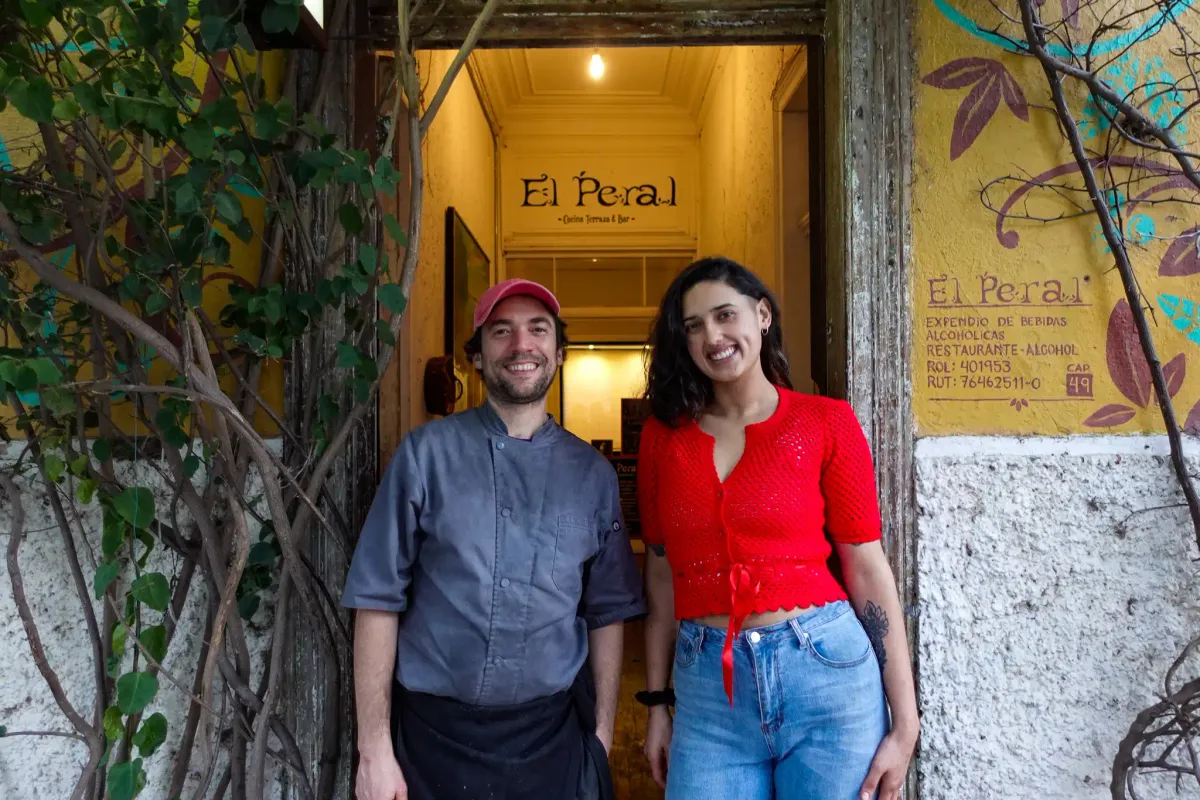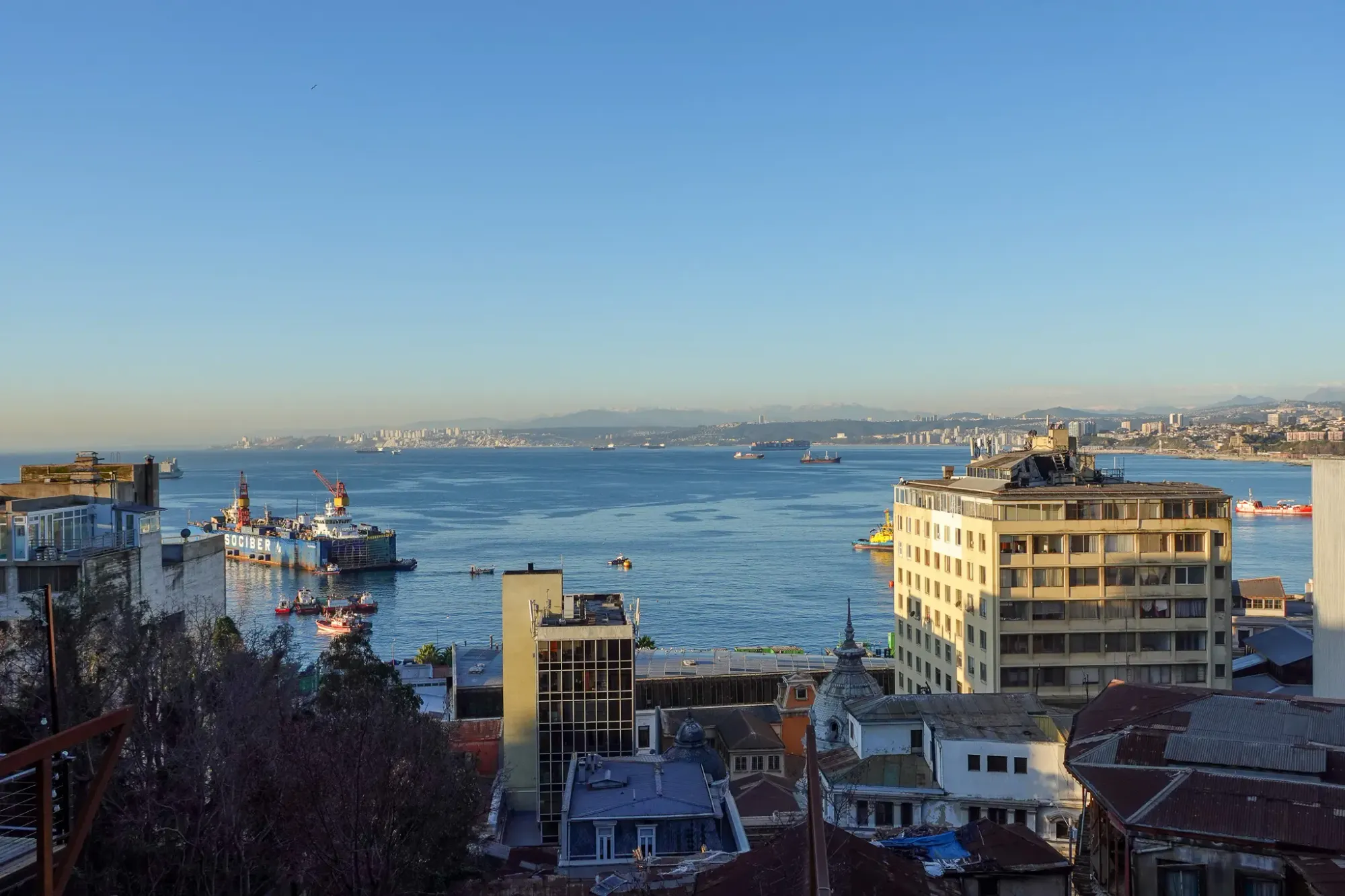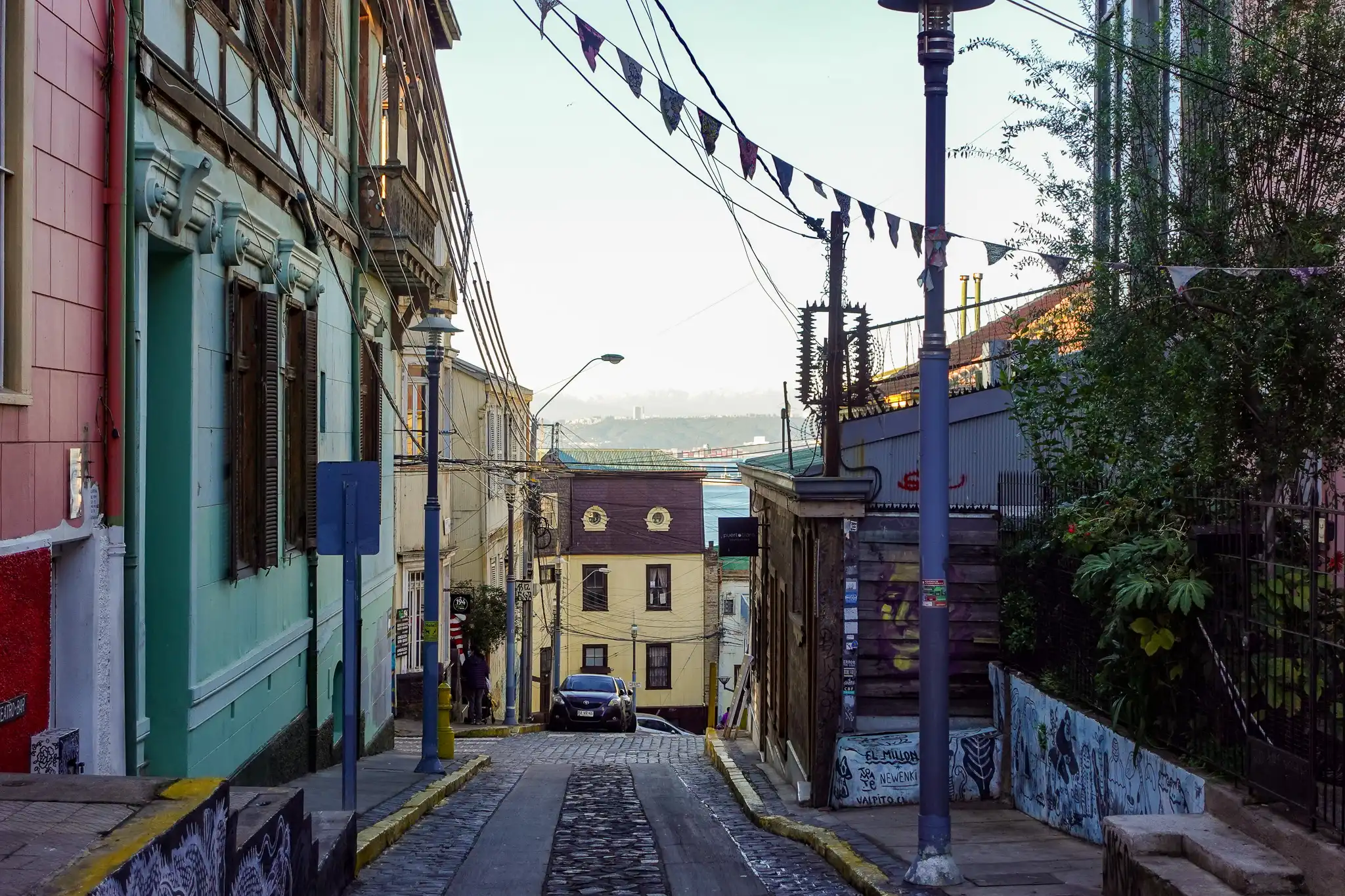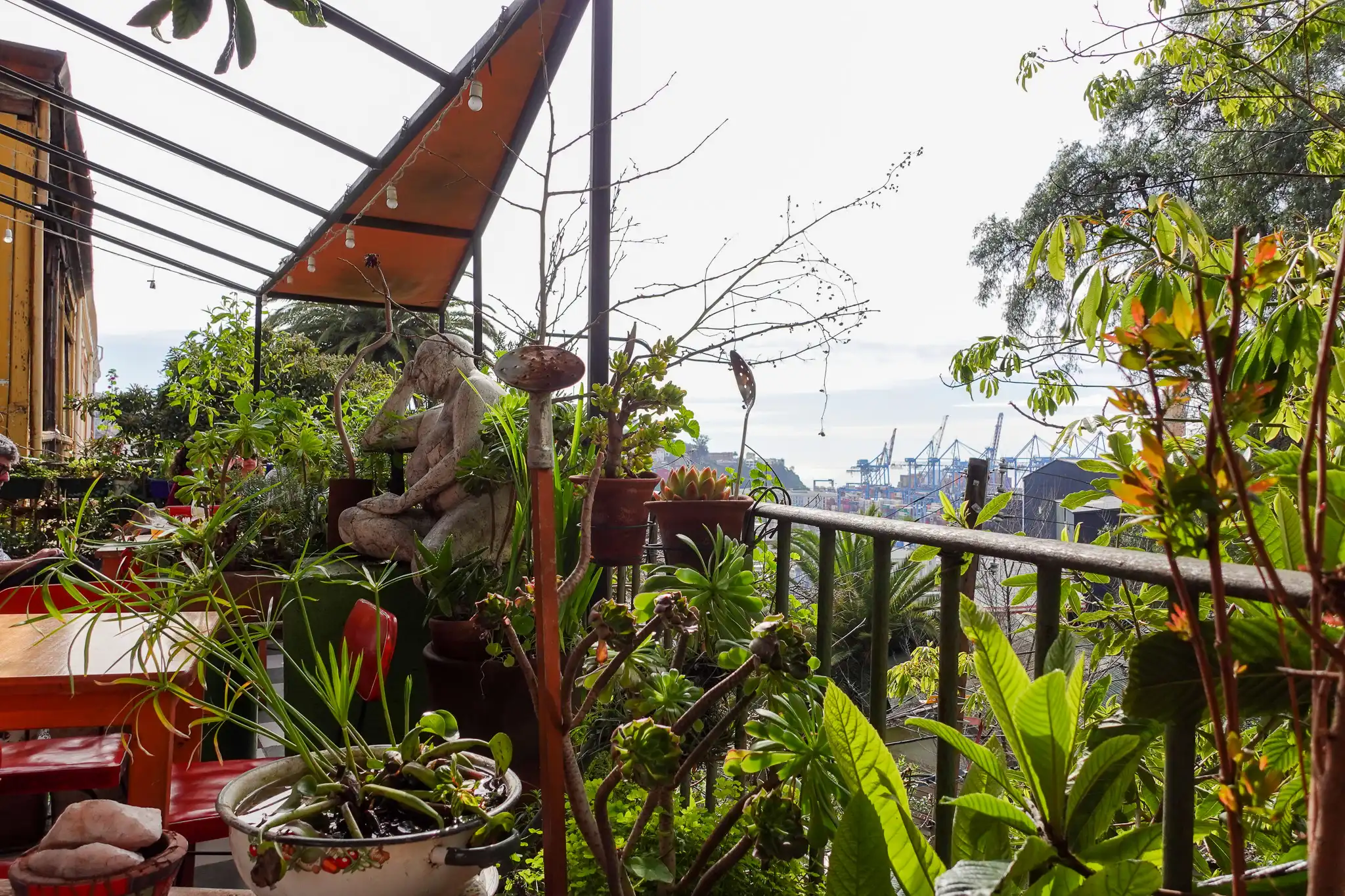In Chile, progress might have to come from chefs

It was the most rain the city had seen in weeks, maybe months. It was unrelenting, but so was my hunger.
Braving the downpour, we make our way up and down the network of hills on which the city of Valparaíso, Chile, is built. Just about every street is lined with houses painted in blue, yellow, and red pastels. Cerro Alegre ("happy hill" in English) is a particularly vibrant neighborhood that not even a deluge could dull.
Soaking wet, we eventually found refuge under the small awning of a potential lunch spot. Sadly, El Peral was closed, so we stood under the awning keeping dry while evaluating our options. We weren't alone; a friendly dog also seemed to be waiting out the rain with us, though mostly unfazed by our presence.
Suddenly the door behind us opens. The owner of El Peral steps out, calling for Lupo, his dog. Both startled and amused by our existence, Bruno invites us in to wait out the rain.
He tells us how he was roasting some squash and waiting for his weekly bread delivery when his dog Lupo decided to wander off - but that wasn't an unusual occurrence for Lupo - he's rather independent.
It was an older building, but the years have given it a character that you don't typically find back home. Original dark wood floors, crown molding, huge windows, and French doors opening to a patio adorned with plenty of plants and greenery.
With the rain not showing any sign of relief, the conversation turns toward his restaurant, El Peral. About ten years ago, Bruno and a few of his friends decided to open a restaurant. Of the three, two had previously worked as chefs, while Bruno was mostly self-taught.
When a property they had their eyes on for a while went up for sale, they jumped at the chance. The restaurant started as a typical bistro in Chile and a chance for Bruno to cut his teeth in the restaurant business. Eventually, his friends left leaving Bruno and his partner Ignacia at the helm of El Peral.
When the pandemic hit Chile, things started to change for their restaurant. Reliance on food delivery made Bruno and Ignacia rethink the menu. Rather than typical mains that might not keep well during transit, they started to focus on plates that could box up and travel well - like sandwiches. It also allowed them time to reflect on the type of food they were serving and the ingredients being used - a growing interest for both Ignacia and Bruno.

The last few years didn't just change the menu at El Peral; the entire country of Chile started to go through a significant transformation as well.
In 2019, after an increase to Santiago's subway fare on October 6th, a group of students organized a large-scale fare evasion. Police and authorities reacted, and after a series of escalating events, mass protests and demonstrations broke out in what is now known as the Estallido Social. Of course, the protests weren't simply about the subway fare increase, tensions had been brewing in the country for years.
Back in 1970, Chile elected Salvador Allende, the first socialist to be elected in a liberal democracy in Latin America. Allende wanted to nationalize major industries, expand education, and generally improve the lives of the working class.
At the same time, the Nixon administration in the United States was fearful of another communist dictator coming to power and, as such, was hell-bent on getting rid of anything that resembled communism. Eventually, in 1973, Allende was ousted by a military coup that may or may not have been supported by the U.S. - history is admittedly a little murky.
With Allende gone, a man by the name of Augusto Pinochet took control of Chile and ruled it through a military junta. Pinochet's authoritarian regime was brutal, deadly, and destructive to the Chilean people. His regime ended years of democratic process and, in 1980 ushered in a new constitution for Chile, which is still in effect today.
That constitution was crafted under the influence of the "Chicago Boys" - a group of University of Chicago-trained neo-liberal economists poised to show Chile the way of capitalism. It privatized most public services, limited state spending, and exported natural resources.
Not surprisingly, inequality has been on the rise in Chile since the 1970s, with social tensions bubbling just beneath the surface.
After the events of the Estallido Social and roughly 40 years of living under Pinochet's constitution, in 2020, 78% of Chilean voters voted to re-write their current constitution. The protests and demonstrations also led to Gabriel Boric, a then 35-year-old left wing being elected president in 2021.
After ten months of drafting and revising, the new president and his government landed on a final proposal for the new, more progressive constitution. Copies of the draft were available for Chilean citizens to read and understand what it entailed, such as declaring Chile a "plurinational" state, recognizing the rights of Chile's indigenous population, the right to abortion, and requiring that women hold at least 50% of positions in official institutions - to name only a few of the new provisions.
A referendum was set to be held on September 4th, 2022, where Chileans could vote for or against the new, more progressive constitution.

Like many I talked to, Bruno and Ignacia were skeptically optimistic about a new constitution, "It's different, at least. We have a little more hope." Bruno said.
But still, it represented significant change, and rewriting a nation's entire constitution is no small feat. As general supporters of the new direction, they felt some of the biggest problems in Chile were still not being addressed:
"There are many subjects that haven't been taken into consideration that are important, like health or education," said Ignacia, "The health here is horrible, people eat a lot of sugar and processed foods. You can see it not only in the physical state of people but also in their mood."
And the numbers back it up. In 2019, the Organisation for Economic Co-operation and Development (OECD) put out an assessment of Chile's public health situation. In the assessment, the OECD states that "Chile’s biggest challenge, though, is that in Chile 34.4% of adults are obese, and 44.5% of children are obese or overweight."
The eye test will tell a similar story - McDonald's, Taco Bell, Walmart (known as Líder in Chile), and old Coca-Cola advertisements are surprisingly frequent sightings during a trip to Chile. That might sound like a silly qualitative metric to judge a country's food on, but the frequency was much higher than in most other countries in South America.
So what does Chilean cuisine look like?
Admittedly before going to Chile, I wasn't entirely sure what constituted Chilean food. One would imagine that with a long coastline and dramatic mountain range, they might have some interesting cuisine. I mean, Chilean Sea Bass is a thing, right? (Actually, no, that's just marketing). Chile produces wine, and wine-making countries have good food, right?
Well, not quite.
"There's not a big gastronomic culture or curiosity here. They just want the easy thing that will satisfy them," Bruno says, explaining the huge presence of fast food.
Trying to shift the Chilean mentality toward food played a big part in shaping the current menu at El Peral. Not surprisingly, getting people to listen is easier said than done - "We actually do not advertise that it's vegan," Ignacia said, "A lot of people from Chile come to our restaurant and say 'Smoked beetroots? This is vegan? No, I don't like it.'" It's a refrain that was and still is, pretty common in the United States.
And technically, El Peral isn't 100% vegan, the menu does have some seafood options because, according to Ignacia and Bruno, they can't afford not to. But even still, they only use fish native to Chile, like reineta and rockfish, and they'll even work with local fishermen to source them.
But the spirit of the menu is decidedly vegan, perhaps best captured by the Beta Smoke -
Smoked beetroots and quinoa burger, fresh tomato, lettuce, red onion rings, homemade pickles, homemade cheddar style vegan cheese and homemade ketchup. In beetroot brioche.
The Beta Smoke was the first menu item on the new El Peral menu and Bruno's favorite to make - but he admits his bias. It's not pompous, overly expensive vegan food that tries to be something it isn't - the menu at El Peral is approachable yet creative.
"Healthy food, vegan food, sometimes isn't accessible...the idea is that this goes to everyone," Ignacia says.

A few days later, the rain eventually left, and the Pacific Ocean was back in plain site from atop Cerro Alegre. It's lunchtime, and there's a man playing guitar alongside our table out on the plant-laden terrace of El Peral. The terrace fits about ten tables, most of them taken up by eager guests.
Meanwhile, inside the kitchen, Bruno and Ignacia are nothing short of mad vegan scientists at work. Both being self-taught chefs, they are students of the craft as well, constantly experimenting, tweaking, and refining their menus.
A quick look around and you'll find jars and containers filled with all kinds of pickled vegetables, sauces, tinctures, and spice mixes - all crafted in-house.
Bruno is preparing their signature sandwich, the Beta Smoke, for some guests on the terrace. People eat with their eyes, a fact that Bruno and Ignacia are certainly aware of. The Beta Smoke itself has purples, reds, greens, and yellows stacked together and placed on a light blue plate alongside some crispy golden potatoes.
The plating of the sandwich feels like their final attempt at convincing you to eat more vegetables. If that plate doesn't work, there's no hope for you.
Two months after talking to Bruno and Ignacia, on September 4th, 2022, almost 62% voted against the new progressive constitution.
Sometimes it feels like the distance between the idea and implementation of change is insurmountable.
Indeed much has been made of the resounding rejection of the new constitution. This setback has sent president Boric and his team back to the drawing board, learning from their mistakes and hopefully listening to their people.
But as another proposal for a new constitution is being drafted, I can't help but think people like Ignacia and Bruno are offering a more tangible proposal of change. One that can have just an equally profound impact if people listen. Or taste.
